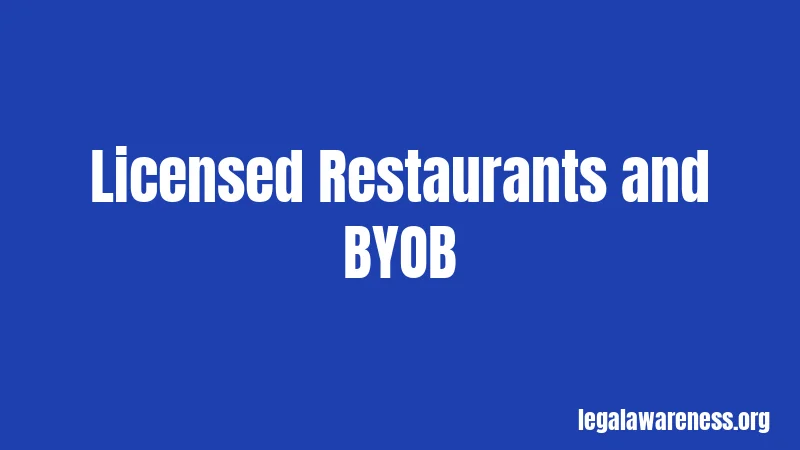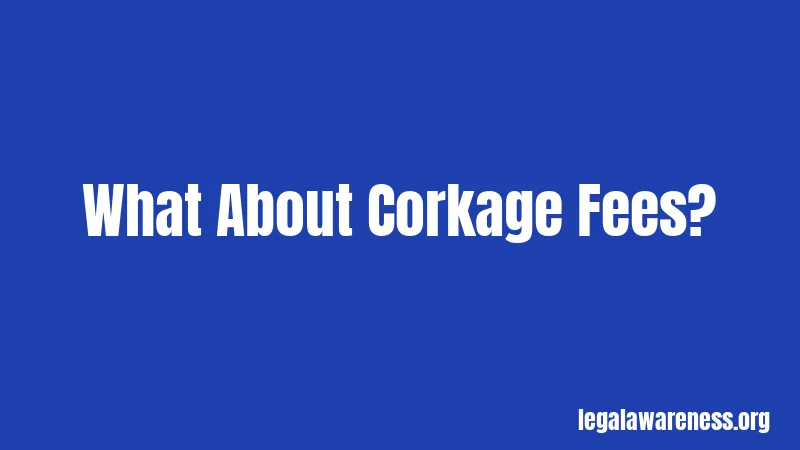BYOB Laws in Florida (2026): Rules About Bringing Your Own Bottle
Most people think bringing wine to dinner is totally fine. It’s not always. Florida has strict rules about BYOB that catch people by surprise.
Let’s break down exactly what you can and can’t do.
What Does BYOB Mean?

BYOB stands for “Bring Your Own Bottle.” Sometimes it’s called “Bring Your Own Booze” or “Bring Your Own Wine.”
It means bringing your own alcohol to a restaurant instead of buying theirs. Sounds simple, right?
Here’s the thing. Florida law makes it more complicated than you’d think.
The Basic Rule in Florida
Here’s the deal. Only restaurants with liquor licenses can let you bring your own alcohol.
If a restaurant doesn’t have a license to sell alcohol, you can’t bring your own there either. Yep, that’s right.
This surprises a lot of people. You might think an unlicensed place would be perfect for BYOB. But Florida law says no.
Licensed Restaurants and BYOB

Restaurants that sell alcohol can allow BYOB. But they don’t have to.
It’s totally up to the restaurant. They can say yes or no.
Most places that allow it will charge a corkage fee. We’ll get to that in a minute.
Sound complicated? It actually gets simpler once you know the rules.
Unlicensed Restaurants Are Off Limits
This part is important. Restaurants without liquor licenses cannot allow BYOB.
Florida Statute 562.02 makes this illegal. The restaurant can get in serious trouble for allowing it.
You could face penalties too. Don’t risk it.
If you’re not sure whether a restaurant has a license, just ask. Seriously, it takes two seconds.
What About Corkage Fees?

Okay, so what’s a corkage fee? It’s what restaurants charge to open and serve your wine.
Florida doesn’t regulate how much restaurants can charge. They can set any price they want.
Most places charge between $15 and $30. Fine dining spots might charge more.
Always call ahead and ask. Don’t assume anything.
The restaurant is losing money when you bring your own bottle. The corkage fee helps make up for that.
Rules You Need to Follow
Wondering if this applies to you? Here are the key rules.
First, always get permission before bringing alcohol. Call ahead. Don’t just show up with a bottle.
Second, check the restaurant’s wine list. Don’t bring something they already sell. That’s considered bad form.
Third, be discreet. Put your bottle in a bag. No need to make a big show of it.
Trust me, this works better for everyone.
Age Requirements Still Apply
Just because you bring your own doesn’t mean age laws disappear. They still apply.
You must be 21 or older to bring alcohol. The restaurant must check IDs.
Restaurant staff can’t serve your alcohol to anyone under 21. That’s a serious violation.
They could lose their license. You could face charges too.
What Types of Alcohol Can You Bring?
Most BYOB-friendly restaurants only allow wine. Some allow beer too.
Hard liquor is usually a no-go. Even at places that normally allow BYOB.
Why? Restaurants with full liquor licenses want to protect their spirits sales.
Makes sense when you think about it.
Corkage Etiquette
Here’s some insider knowledge. Restaurant staff appreciate good BYOB etiquette.
Tip based on what your total bill would have been. Include what you would have spent on wine.
Your server still does the same work. They deserve the same tip.
Buy at least one bottle from the restaurant’s list if you’re bringing special wines. Honestly, this is just good manners.
Local Rules Can Vary
Hold on, this part is important. Counties and cities can add their own rules.
Some areas might have stricter BYOB regulations. Others might be more relaxed.
Always check with the specific restaurant in your area. They’ll know the local laws.
Don’t assume what works in Miami works in Tampa. It might not.
What Happens If You Break the Rules?
Let’s talk about the penalties. They’re not pretty.
Restaurants allowing BYOB illegally can lose their license. They can face fines too.
Customers can be charged with possession of alcohol at an unlicensed establishment. That’s a misdemeanor.
The restaurant could face criminal charges for allowing it. This is serious stuff.
Special Restaurant Types
Certain restaurants have different rules. Let me break it down.
Hotels with restaurants usually allow BYOB if they’re licensed. But each hotel sets its own policy.
Food trucks rarely allow BYOB. Most don’t have the proper licenses.
Private clubs operate under different license types. Their BYOB rules vary widely.
Removing Unfinished Wine
Okay, this one’s actually helpful. Florida law lets you take home unfinished wine.
You need to have ordered a full meal. That means salad or vegetable, entrée, beverage, and bread.
The restaurant must reseal the bottle properly. They’ll put it in a special bag.
You can see if the bag has been tampered with. The restaurant also provides a dated receipt.
Pretty straightforward.
When BYOB Is Never Allowed
Some situations are automatic no-gos. Pay attention here.
You can’t bring alcohol to fast-casual restaurants without licenses. Even if you’re getting takeout.
Bar-only establishments won’t allow it. They make all their money from drink sales.
Places in dry counties prohibit all alcohol. That includes BYOB.
How Restaurants Verify Licenses
Wondering how to know if a place is legit? Here’s what to look for.
Licensed restaurants display their license publicly. It’s usually near the entrance or bar.
The license shows what types of alcohol they can sell. Wine only, beer and wine, or full liquor.
If you can’t see a license, ask to speak with a manager. They should be able to show you.
Common Misconceptions
Most people get this wrong. Let me clear things up.
“I can bring wine anywhere if I’m paying for food.” Nope. The restaurant needs a license.
“Unlicensed places are perfect for BYOB.” Actually, that’s backwards. They can’t allow it at all.
“Corkage fees are illegal price gouging.” They’re not. Restaurants set their own fees legally.
Tips for a Smooth BYOB Experience
Want to avoid problems? Follow these tips.
Call the restaurant a week ahead. Ask about their BYOB policy and corkage fees.
Bring quality wine that’s not on their list. Show respect for their business.
Arrive with your bottle in a wine bag. Keep it low-key.
Tip generously. Your server works just as hard.
Recent Changes to Watch
Florida alcohol laws change sometimes. Here’s what’s new.
In 2025, Florida passed new fee disclosure laws. Restaurants must clearly list all charges starting July 2026.
This includes corkage fees. They need to be on menus and receipts.
The law aims to prevent surprise charges. Good news for consumers.
What About Private Events?
Private events have different rules. It gets interesting.
Restaurants can allow BYOB at catered private events. But they need special approval.
The event must be in an approved location. The restaurant’s license must cover catering.
Public events at restaurants follow normal BYOB rules. No special exceptions.
Penalties for Restaurants
Let’s talk about what restaurants face. This explains why they’re so careful.
Allowing BYOB without a license is a second-degree misdemeanor. That means up to 60 days in jail.
Fines can reach $500. Plus they could lose their business license.
Serving minors your BYOB alcohol? That’s even worse. First-degree misdemeanor with higher fines.
Penalties for Customers
You’re not off the hook either. Here’s what you could face.
Possessing alcohol at an unlicensed restaurant is illegal. It’s a violation of Florida’s beverage law.
You could be fined. In some cases, you might face misdemeanor charges.
If you’re under 21, penalties are much harsher. Don’t even think about it.
How to Find BYOB-Friendly Restaurants
Okay, so how do you actually find places that allow it? Pretty simple.
Call restaurants directly. Ask if they allow BYOB and what they charge.
Check review sites like Yelp. Other customers often mention BYOB policies.
Look for small wine-focused bistros. They’re more likely to allow BYOB with corkage fees.
The Restaurant’s Perspective
Here’s something most people don’t think about. Restaurants have valid concerns.
They lose profit when you bring your own. Their wine sales make up a big chunk of revenue.
Corkage fees help offset this. But they still make less than if you bought from them.
Some restaurants just say no to BYOB. It’s their right.
Beer and Wine vs. Spirits
Not all alcohol is treated equally. This matters.
Most BYOB-friendly places allow wine only. Some add beer to the mix.
Hard liquor is almost never allowed. Even at restaurants with full bars.
Why the difference? Wine has lower profit margins. Spirits are where restaurants make real money.
Tourism and BYOB
Florida gets tons of tourists. They often ask about BYOB.
Tourists should follow the same rules as residents. No exceptions.
If you’re visiting from a state with different BYOB laws, don’t assume Florida’s the same. It’s probably not.
When in doubt, ask. Restaurant staff would rather answer questions than deal with violations.
What Counts as a “Restaurant”?
This actually matters legally. Let me explain.
Florida law defines restaurants specifically. They must serve food as their primary business.
Places that only serve drinks aren’t restaurants. Different rules apply.
The restaurant must also have proper health and safety licenses. Not just liquor licenses.
Insurance and Liability Issues
Here’s something restaurants worry about. Liability.
When you bring your own alcohol, questions arise. Who’s responsible if something goes wrong?
Most restaurants have insurance that covers alcohol service. But BYOB creates gray areas.
This is another reason some places just don’t allow it. Too much risk.
Comparing Florida to Other States
Curious how Florida stacks up? It varies wildly.
Some states allow BYOB at unlicensed restaurants. Florida doesn’t.
Others ban BYOB entirely. Florida’s somewhere in the middle.
California is more permissive. Texas varies by county.
Don’t use another state’s rules as a guide. Every state is different.
What to Do If You’re Unsure
Not sure what to do? Here’s my advice.
Ask the restaurant directly. That’s always the safest bet.
If they say no, respect it. Don’t try to sneak anything in.
If they say yes, ask about fees and rules. Get clarity upfront.
When in doubt, just buy from the restaurant. Easier for everyone.
Frequently Asked Questions
Can I bring wine to any restaurant in Florida?
No. Only restaurants with liquor licenses can allow BYOB. Even then, it’s up to the restaurant’s policy.
Are corkage fees legal in Florida?
Yes. Florida doesn’t regulate corkage fees. Restaurants can charge whatever they want.
Can I bring beer instead of wine?
Maybe. Some restaurants allow beer, but most BYOB policies are wine-only. Always ask first.
What if the restaurant doesn’t have a license but says BYOB is okay?
Don’t do it. The restaurant is breaking the law. You could face penalties too.
Can I take leftover wine home?
Yes, if you ordered a complete meal. The restaurant must reseal the bottle and bag it properly.
Final Thoughts
Now you know the basics. BYOB in Florida isn’t as simple as other states.
The key rule? Only licensed restaurants can allow it. And even then, they don’t have to.
Always call ahead. Ask about policies and fees. Be respectful.
When in doubt, buy from the restaurant. It’s simpler and supports local businesses.
Stay informed, follow the rules, and enjoy your meal.
References
- Florida Statute 562.02 – Possession of Beverage Not Permitted to be Sold Under License
- Florida Department of Business and Professional Regulation – Division of Alcoholic Beverages and Tobacco
- Tampa, Florida Alcohol Laws – Buda Law
- Florida Wine Corkage Fees & BYO Laws Explained – JustAnswer
- BYOB Restaurant Guide – Uncorking BYOB
